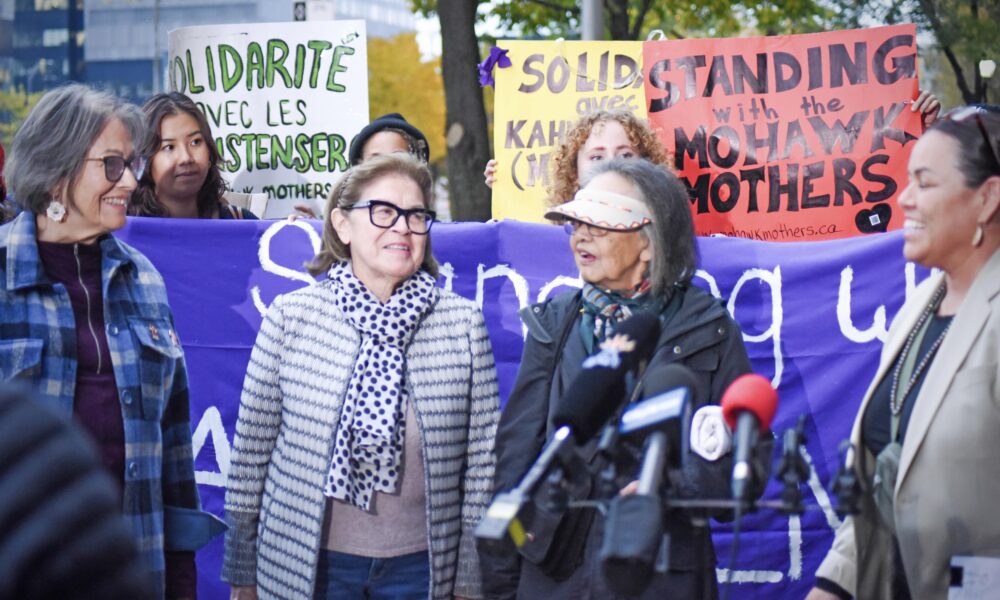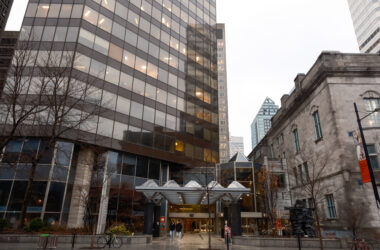Content Warning: Mentions of assault and genocide
The Kanien’kehá:ka Kahnistensera (Mohawk Mothers) appeared at the Montreal Courthouse for a five-hour case management hearing on Oct. 27. The hearing came as part of the Mothers’ ongoing investigation into McGill’s New Vic Project site—where the Mothers fear that there may be unmarked Indigenous graves—alongside McGill, the Société québécoise des infrastructures (SQI), the Royal Victoria Hospital (RVH), the City of Montreal, and the Attorney General of Canada.
The Mothers gave the first statement before Justice Gregory Moore. Beginning with Mohawk Mother Kwetiio, the Mothers urged the court to enforce the settlement agreement, which, in Kwetiio’s interpretation, states that all parties are bound to the recommendations of the court-appointed expert archaeological panel. Kwetiio further alleged that McGill had sent contracts to the three members of the panel—which disbanded on Aug. 3—with three-month termination dates. The Mothers were not informed of these contracts until they had already been signed and were irreversible.
Kwetiio argued that Ethnoscop—the archaeological firm hired for the investigation—did not use appropriate methods to protect the forensic chain of custody of any potential evidence, as they were touching evidence with their bare hands and not using tamper-proof bags. She also stated that the defendants were strategically choosing which information they would share with the Mothers in order to continue the investigation without delays.
“There’s been a lot of cherry-picking of what [the defendants] are going to use to help themselves to further their construction, and not the investigation,” Kwetiio said in a press conference after the hearing.
The court then heard from Mohawk Mother Kahentinetha, who shared that potential anomalies were excavated on the site in rapid time which did not allow for proper significance and care to be given to each anomaly. She said that on one day, nine anomalies were excavated with a mere 45 minutes allotted to each anomaly. Kahentinetha claimed that the soil was not sifted properly, and any bone fragments found were immediately deemed to be of animal origin.
In a written statement to The Tribune, the SQI asserted that all excavation is being carried out in accordance with proper archaeological regulations by expert firms, with proper methods used to ensure soil is not mixed or contaminated.
Kahentinetha also shared that after facing verbal assault from SQI security guards on July 25, the Mothers had asked to be accompanied by Indigenous security personnel from T.D. Security while onsite. However, it took three weeks before the defendants complied with this request.
Kwetiio continued, asserting that the Mothers deserve to be treated with respect on the site and should not be subjected to “uncontrollable anger” from the defendants when they ask questions. She ended the Mothers’ statement by contending that the defendants had breached every part of the settlement agreement.
The court took a fifteen-minute break, after which Julian Falconer—the lawyer for the Office of the Independent Special Interlocutor, Kimberly Murray—gave his statement, alleging that the defendants were being denialistic. He stated that the Mothers already had an insurmountable burden placed on them throughout this case, and this burden had “quadrupled” the day the panel was disbanded. He condemned the disbandment of the panel and alleged that McGill and the SQI had replaced the panel with their own archaeological experts so that they could inform the public that they were relying on the advice of experts.
“Today was about bringing back the experts that know how to do this work, to find unmarked burials,” Murray said in a press conference after the hearing. “We have a lot of companies that can do scans. We don’t have a lot of people that have expertise in analyzing the data.”
Later, the court heard from the SQI. Their statement was delivered in French and translated for the Mothers by anthropologist and associate of the Mothers Philippe Blouin. Members of Take Back Tekanontak—an advocacy group in support of the Mohawk Mothers—were stationed outside of the courthouse after the hearing to show solidarity. In an interview with The Tribune, an organizer of Take Back Tekanontak, Diane, who chose not to give her last name, shared her belief that the lack of a court-provided English translation of the SQI’s statement for the Mothers was appalling and oppressively exclusionary.
“The Kanien’kehá:ka Kahnistensera come to court, and they speak Kanyen’kéha, their own language, and their colonial language is English,” Diane said. “It’s not okay to ask them to learn French as a second colonial language, and yet there is no translation provided for them. I cannot believe my eyes.”
McGill’s lawyer, Doug Mitchell, provided the next statement before Justice Moore. He stated that the university believes that it has abided by the settlement agreement wholly and respectfully, arguing the occasional disagreements between parties are not an indication that the agreement is being violated. He asserted that the defendants are bound by the recommendations of techniques by the panel, not to anything else.
Mitchell additionally claimed that Falconer had “theatricized” his speech to the court so that Justice Moore would rule in the favor of the Mothers. He stated that the Mothers needed to take the emotion out of the investigation, alleging that the Mothers and Murray only wanted to enforce their interpretation of the contract and were not suffering any irreparable harm by the way McGill was carrying out the investigation.
Falconer responded to Mitchell’s statement, saying that Mitchell should apologize for asking the Mothers to be less emotional about the investigation. He also argued that all parties should acknowledge that the panel’s recommendations have not been followed, as the panel itself believes its suggestions have not been entirely executed.
“It is absolutely essential that McGill, the Quebec government, [and the] SQI come to their senses and understand that it is very short-sighted to essentially terminate a panel they agreed to be bound by in order a further a development,” Falconer said in a press conference after the hearing. “I promise you, whatever few dollars [the defendants] make on their development, the [societal cost] and the [further erosion] of trust is absolutely innumerable in terms of the size of the expense.”
Kwetiio also replied to Mitchell’s statement, stating that Mitchell’s words were “deeply offensive,” and reiterating the fact that all parties would not be back in court if the recommendations of the panel had been respected.
“I think it was pretty disgusting that the defendant said ‘Oh, there’s no irreparable harm done here.’ […] There’s never a situation where any one of us is going to bargain without children of the past, present, and future,” Kwetiio said in response to Mitchell’s comment in a press conference after the hearing.
Justice Moore adjourned court with no decision made, explaining that he would need some time to review all submissions and testimonies. McGill media relations officer Frédérique Mazerolle told The Tribune in an email that McGill will provide a comment on the hearing once Justice Moore makes a decision. A tentative subsequent court date is set for Dec. 1, during which all parties will discuss the issue of archives and records related to the investigation.
“We demand that we have a proper best practice investigation for our children and for those that were disrespected on that site,” Kwetiio said. “I think our children are looking for us to find them, and this is what’s important, and I’m so glad that all these people are here today in support.”









